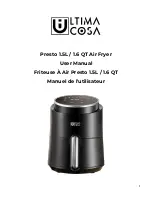
4
Venting Requirements
■
The drying cabinet should not be vented into a chimney, wall,
attic, ceiling or concealed space of a building.
■
The drying cabinet should vent into the room where the
drying cabinet is installed or into an adjacent room.
■
Opening a door or window in the room where the drying
cabinet is installed is suggested for ventilation.
■
4 in. (10.2 cm) heavy metal vent and clamps must be used.
Metal vent should not exceed 3 ft. (91.4 cm) in length.
■
If vented into the room where the drying cabinet is installed, a
minimum spacing of 12 in. (30.5 cm) from the metal vent to
the ceiling is suggested.
■
The drying cabinet must vent outside of the enclosure in
which it is installed.
■
Do not use an exhaust vent hood on the drying cabinet vent.
■
If custom cabinetry is built to enclose the top of the drying
cabinet, leave the venting area open to allow for airflow.
1. Venting into the same room
2. Airflow in and out of the drying cabinet
For a grounded, cord-connected drying cabinet:
This drying cabinet must be grounded. In the event of
malfunction or breakdown, grounding will reduce the risk of
electric shock by providing a path of least resistance for
electric current. This drying cabinet is equipped with a cord
having an equipment-grounding conductor and a grounding
plug. The plug must be plugged into an appropriate outlet that
is properly installed and grounded in accordance with all
local codes and ordinances.
WARNING:
Improper connection of the equipment-
grounding conductor can result in a risk of electric shock.
Check with a qualified electrician or service representative or
personnel if you are in doubt as to whether the drying cabinet
is properly grounded. Do not modify the plug provided with
the drying cabinet: if it will not fit the outlet, have a proper
outlet installed by a qualified electrician.
1
2
1. Venting into an adjacent room
2. Airflow in and out of the drying cabinet
1
2


































